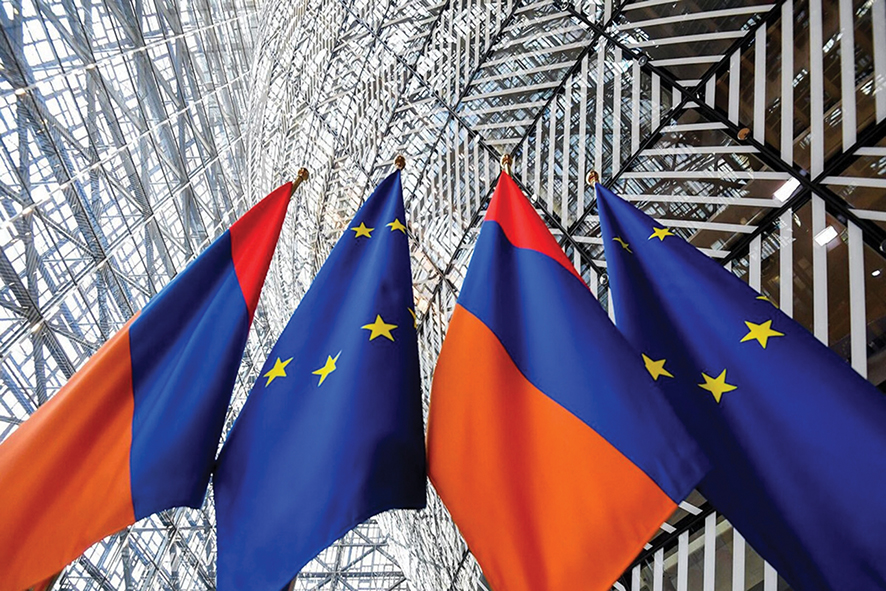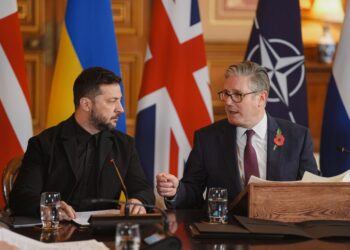Though initially sparked by the resurfacing of a “foreign agents bill” that was believed to have been shelved more than a year prior following fierce public backlash, the ongoing demonstrations in Georgia are the culmination of an ever widening gulf between the country’s ruling class and its disenfranchised masses. In a bid to rationalize this legislation’s necessity, billionaire patron and founder of Georgian Dream (GD), Bidzina Ivanishvili, delivered an inflammatory, anti-Western tirade last month that practically amounted to a war cry and made plain the dystopian future he envisions for his native land.
The de facto father of the nation’s stratospheric ascent to Tbilisi’s corridors of power since his 2003 homecoming is attributable to the fortune he amassed in post-USSR Moscow during the 1990s. While it is no secret that he remains beholden to the Russian Federation, reducing Georgia to a wholly-owned subsidiary of an existing occupier was a bridge too far for the irrepressible “Erasmus” generation. The unprecedented crowds that have paralyzed parts of the capital are therefore unlikely to fizzle out anytime soon, notwithstanding unwarranted police brutality or the plain-clothed goons hired by GD to rough up peaceful protesters.
What started off as mild sympathy towards Russia in the aftermath of its “special military operation” has metastasized into a borderline fetish for Kremlin-inspired governance. Ivanishvili’s alarmism regarding the national security threat posed by overseas-funded NGOs and independent media outlets is somewhat ironic, seeing as he and his functionaries are arguably the biggest purveyors of malign foreign interests.
Former Prime Minister Irakli Garibashvili played a pivotal role in launching the Sino-Georgian Strategic Partnership earlier this year, just as the Collective West is trying to de-risk and decouple from the People’s Republic. Much like the Hungarians and Serbs, the Georgians have fallen hook, line and sinker for Beijing’s “sugar daddy” diplomacy, which is tacitly passed off as “win-win” cooperation by BRI-focused Chinese President Xi Jinping. It is worth recalling that Garibashvili was part of a CCP-devised “revolving door” strategy which saw him land a cushy advisory role on the board of CEFC China Energy in 2018 and parachuted back into frontline politics three years later to do the bidding of his paymasters.
Meanwhile, the current incumbent Irakli Kobakhidze appears content to serve as a mouthpiece for the ultra-nationalist wing of United Russia and echo their sensationalist talking points on Ukraine, as well as the culture wars, militant wokery and fifth columns accelerating Europe’s demise. As for commander-in-chief Salome Zurabishvili, she routinely makes it out to seem as though the Georgian Presidency is ceremonial and that the buck does not stop with her when it comes to the wholesale “Russification” of local society. Her condemnation of the transparency law and the token veto she has pledged to exercise after its official adoption by Parliament are pure theater. Had Zurabishvili been sincere about heeding the will of the people and wanting Georgia to join the so-called “European Family,” she would have used her executive authority to pardon incarcerated ex-President Mikheil Saakashvili. Needless to say, Georgia’s EU candidacy is no fait accompli, and risks ending up in a Turkey-esque deep-freeze should an already ailing Saakashvili suffer the same fate as deceased Russian opposition leader Alexei Navalny. Unless Brussels and Washington tighten the noose around the necks of Tbilisi’s compromised leadership via targeted individual sanctions, GD will continue to go rogue and foist one rude awakening after the other upon ordinary citizens.

On that note, the Eurocrats bear some degree of culpability for Georgia’s Eurasian pivot and not doing enough to cut the one-man oligarchy it is captured by down to size. Window dressing initiatives like Air Schengen and refugee burden-sharing not only undermine the value proposition of being in the EU, but also lay bare its two-tier membership policy and the different set of standards newer entrants are held to.
The fact that Romania and Bulgaria had to settle for “partial” admission into the world’s largest borderless travel zone after a 13-year wait is emblematic of the second-class treatment peripheral member states are extended. Worse still, the bloc readily endorsing Austria’s watered-down “Schengen lite” proposal for Bucharest and Sofia without any pushback shows that there is limited political will for expanded free movement, despite statements to the contrary by its top brass. European Commission Head Ursula Von der Leyen is particularly notorious for speaking out of both sides of her mouth on this issue – having repeatedly hinted at the EU’s desire to build on its 2004 eastward enlargement, yet simultaneously obstructed the yellow brick road to Brussels with steep, and often impracticable demands for existing candidates to fulfil.
At the same time, Albania’s recent migration pact with Italy sets a dangerous precedent, as it could encourage fellow Mediterranean jurisdictions to pile on and sub-contract their asylum woes to the Western Balkans or South Caucasus. For a tourism-dependent economy like Georgia, it does not make business sense to forgo the steady revenue stream generated from affluent Middle Eastern and CIS vacationers by aligning their entry requirements with those of the EU or potentially becoming a regional “Rwanda” amid the Israel-Hamas conflict. Tbilisi is instead seeking to position itself as the nerve centre of the “multipolar world order” Putin salivates over and has interestingly tied up with the Asian Development Bank (ADB) to nurture this ambition. Kobhakidze even announced plans to construct a new international airport near the Vaziani Military Base with a less Europe-centric flight network and the capacity to accommodate 19 million passengers – a sizeable chunk of which are expected to be from the BRICS+ nations and other key emerging markets.
Neighboring Armenia, by contrast, has found itself on a collision course with Moscow over the past couple of years, and has emerged far more amenable to EU membership as a result. Whether it means getting rid of Russian boots on the ground, putting its Collective Security Treaty Organization (CSTO) participation and funding on ice, or signing up to the International Criminal Court (ICC) mere weeks after an arrest warrant was issued for Putin, there are telltale signs of Yerevan looking to break into the European fold at any cost. Aside from the laudable baby steps taken by Prime Minister Nikol Pashinyan to emancipate Armenia from the Kremlin’s long arm, his administration is pursuing a values-based foreign policy agenda in sync with Western expectations. As the Georgian government presses ahead with frantic “speed-dating” overtures vis-à-vis authoritarian regimes in the Global South, Yerevan is bolstering its engagement with like-minded democracies such as France, Greece and even India. Equally praiseworthy is Armenia’s determination to leave no stone unturned in establishing a modus vivendi with Azerbaijan. Pashinyan’s deeply unpopular decision to cede four villages to Baku could, with the passage of time, prove to be a diplomatic masterstroke if lasting peace along the border is secured and Armenia deservedly supplants Georgia as the Transcaucasian frontrunner for EU accession.
Analysis by Saahil Menon














